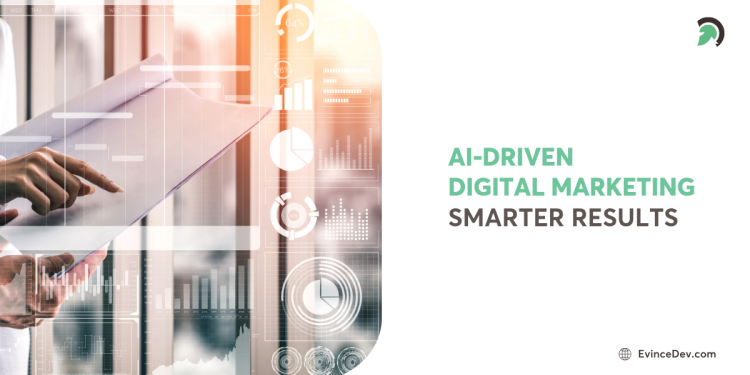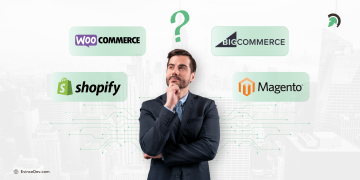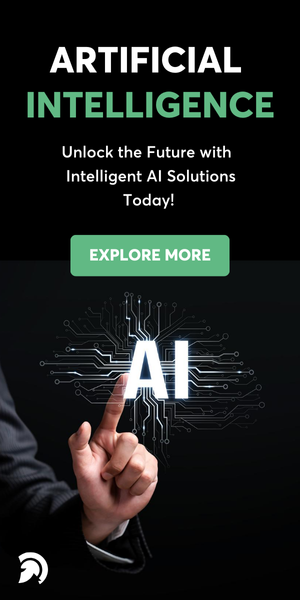In today’s rapidly evolving digital landscape, staying ahead of the curve in marketing is crucial for businesses seeking to maintain a competitive edge. One of the most transformative technologies in recent years is Artificial Intelligence (AI), which has revolutionized various industries, including marketing. AI-powered digital marketing has proven invaluable, enabling businesses to enhance their marketing strategies, drive customer engagement, and achieve better outcomes.
In this blog, we will explore the different aspects of AI in digital marketing, its impact on marketing strategies, the tools available, ethical considerations, and future trends.
- Global market revenues of AI usage in marketing expected to reach 36 billion U.S. dollars in 2024.
- 75% of marketers believe that AI-enabled search engines will positively impact their blogs, and 68% predict that their site will get more traffic. Only 9% believe this will harm blog traffic.
- It is projected to experience a compound annual growth rate (CAGR 2024-2029) of 9.25%, leading to a market volume of US$8.0bn by 2029.
Understanding AI in Digital Marketing
AI-powered digital marketing refers to the utilization of AI algorithms and technologies to enhance various marketing activities. It encompasses a wide range of applications, including data analysis, predictive analytics, content creation, personalization, and customer engagement. By leveraging AI, marketers can gain valuable insights, automate processes, and deliver highly targeted and personalized experiences to their audience.
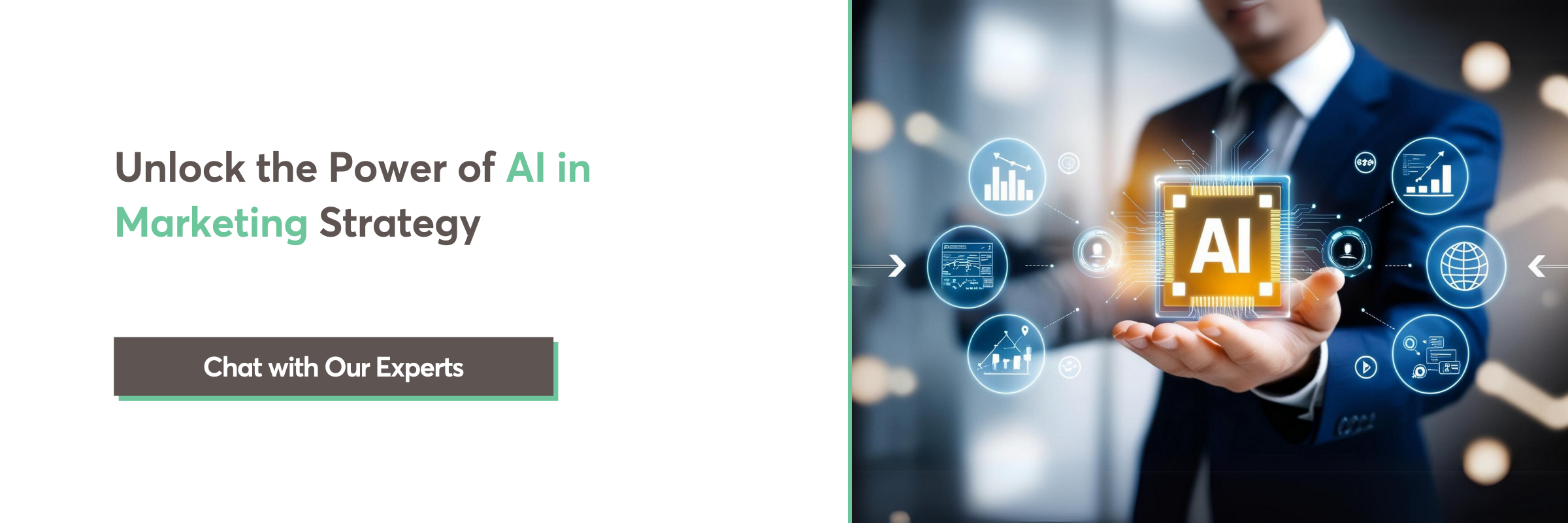
AI-powered digital marketing is revolutionizing the way businesses interact with their customers. AI allows marketers to create hyper-personalized campaigns that resonate with individual preferences and behaviors. It increases customer engagement, drives higher conversion rates, and boosts brand loyalty.
Role of AI in Modern Marketing
In today’s fast-paced digital landscape, AI plays a crucial role in modern marketing strategies. It empowers marketers to process vast amounts of data quickly, identify patterns and trends, and make data-driven decisions. AI algorithms can analyze consumer behavior, preferences, and buying patterns, enabling businesses to tailor their marketing efforts based on individual customer needs. Furthermore, AI-powered technologies such as machine learning and natural language processing enable marketers to automate tasks, improve efficiency, and deliver a more personalized and seamless customer experience.
AI in modern marketing goes beyond just optimizing campaigns; it also enables businesses to forecast future trends and anticipate customer needs. By leveraging AI-powered predictive analytics, marketers can proactively adjust their strategies to meet changing market demands and stay ahead of the competition. It is not only enhances customer satisfaction but also drives long-term business growth and success.
Impact of AI on Digital Marketing Strategies
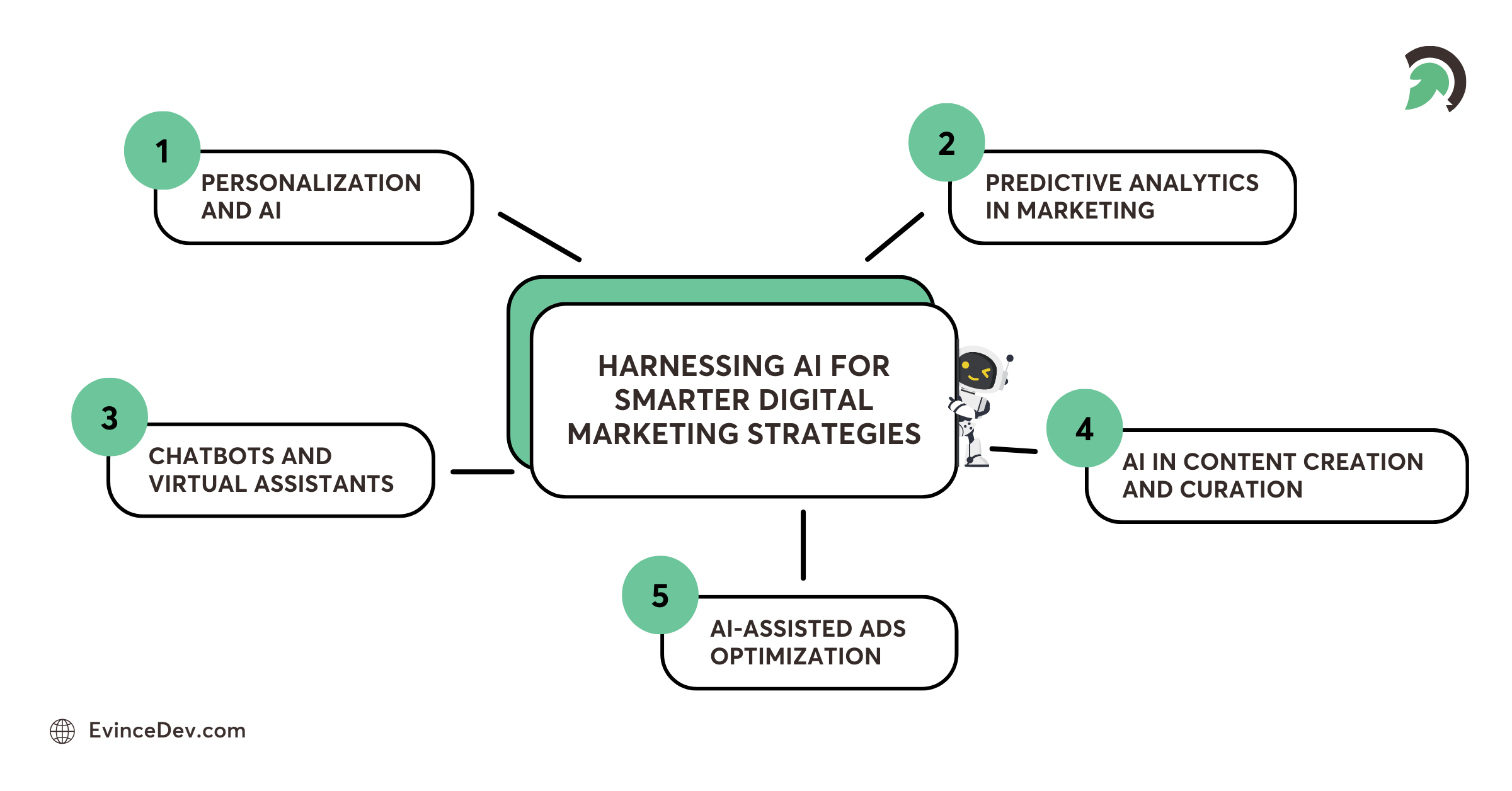
Personalization and AI
Personalization is a key aspect of successful marketing campaigns, and AI is a game-changer. By utilizing AI algorithms, marketers can collect and analyze vast amounts of data about individual customers. It enables businesses to create highly personalized marketing campaigns tailored to each customer’s specific needs and preferences. From personalized product recommendations to targeted email marketing, AI allows marketers to deliver relevant and engaging content, ultimately driving better customer engagement and increasing conversion rates.
Furthermore, AI-powered personalization goes beyond just recommending products based on past purchases. It can also analyze real-time behavior, such as browsing history and social media interactions, to offer personalized recommendations in the moment. It creates a seamless and individualized experience for customers, enhancing brand loyalty and overall satisfaction.
Predictive Analytics in Marketing
Predictive analytics, driven by AI, enables marketers to make accurate forecasts and predictions about future consumer behavior. By analyzing past data, AI algorithms can identify patterns and trends, allowing marketers to anticipate customer needs and preferences. It can be used to optimize marketing strategies, improve campaign performance, and generate higher returns on investment. Predictive analytics also enables businesses to allocate resources more effectively, ensuring that marketing efforts deliver the desired results.
Moreover, predictive analytics can help marketers identify new market opportunities and potential threats. By leveraging AI to analyze market trends and consumer behavior, businesses can stay ahead of the competition and adapt their strategies proactively. It increases the effectiveness of marketing campaigns and fosters innovation and continuous improvement within the organization.
Chatbots and Virtual Assistants
Chatbots and virtual assistants have become increasingly popular in recent years, transforming the way businesses interact with their customers. Powered by AI, it can simulate human conversation and provide instant, automated responses to customer inquiries. Chatbots can handle a wide range of tasks, from answering frequently asked questions to assisting with product recommendations. By integrating chatbots into websites, social media platforms, and messaging apps, businesses can enhance customer support, improve engagement, and deliver a seamless and personalized user experience.
Moreover, the advancements in natural language processing (NLP) have significantly improved the capabilities of chatbots and virtual assistants. They can now understand and respond to more complex queries, leading to more meaningful interactions with users.
AI in Content Creation and Curation
Content creation and curation are essential components of digital marketing. AI-powered technologies can help streamline and enhance these processes. Content creation driven by AI can generate engaging and high-quality content, reducing the time and effort required by marketers. It can analyze vast amounts of content and recommend the most relevant and valuable pieces to users, enabling businesses to curate personalized content experiences for their target audience.
Furthermore, AI can also assist in optimizing content for search engines by analyzing keywords, trends, and user behavior data. It helps marketers tailor their content strategies to improve visibility and reach their target audience more effectively. By leveraging AI in content creation and curation, businesses can stay ahead of the competition and deliver compelling and relevant content that resonates with their customers.
AI-assisted Ads Optimization
AI-assisted ads optimization revolutionizes digital marketing by enhancing the effectiveness of ad campaigns. AI can analyze vast datasets through machine learning algorithms and data analytics to identify patterns and predict audience behavior. This allows for real-time adjustments to ad targeting, placement, and bidding strategies, ensuring that ads reach the right people at the right time.
According to some estimates, spending on AI-enabled advertising could exceed $1.3 trillion dollars in ten years.
By leveraging AI, marketers can automate testing, optimize ad creatives, and allocate budgets more efficiently. AI also helps in predicting which channels will perform best for a specific audience, leading to improved ROI. Personalization is another key benefit; AI ensures ads are tailored to individual user preferences, boosting engagement and conversions.
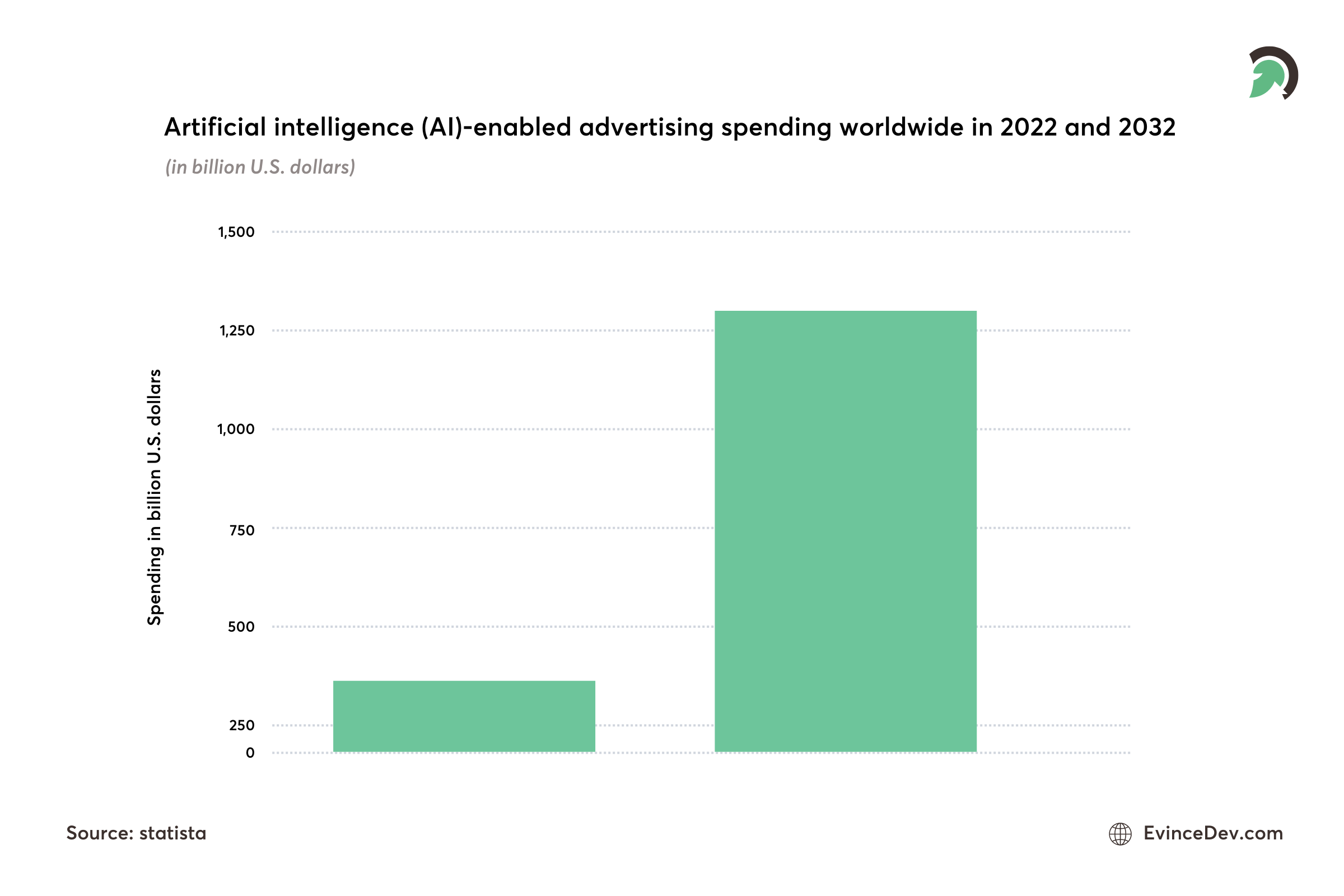
With continuous learning from past performance, AI-assisted ads become more intelligent over time, enabling businesses to fine-tune their strategies with precision. In a competitive digital landscape, adopting AI-powered ad optimization is essential for staying ahead of the curve and achieving consistent marketing success.
Ethical Considerations in AI-Powered Marketing
Data Privacy and Security
As AI-powered marketing relies heavily on data collection and analysis, ensuring data privacy and security is of paramount importance. Businesses must adhere to strict data protection regulations and take necessary measures to safeguard sensitive customer information. It is crucial to be transparent with customers about data usage and obtain proper consent for data collection and processing. Implementing robust cybersecurity measures is essential to protect against data breaches and unauthorized access.
Furthermore, in the realm of data privacy and security, it is imperative for companies to stay abreast of evolving technologies and potential vulnerabilities. Regularly updating security protocols and conducting thorough risk assessments can help mitigate the risks associated with cyber threats. Engaging in continuous employee training on data security best practices can also fortify a company’s defenses against potential breaches.
Transparency and Accountability in AI
Transparency and accountability are vital when implementing AI in marketing strategies. Marketers should be transparent with customers about the use of AI algorithms and clearly communicate how these algorithms impact marketing decisions. It is crucial to ensure that AI algorithms are fair and unbiased, avoiding any potential discrimination or unfair targeting. Regular monitoring and auditing of AI systems are necessary to identify and rectify any potential biases or issues.
Moreover, fostering a culture of transparency within the organization can enhance accountability in AI-powered marketing initiatives. Encouraging open communication channels between data scientists, marketers, and decision-makers can facilitate the ethical use of AI technology. Establishing clear guidelines and ethical frameworks for AI implementation can help align business objectives with ethical considerations, promoting trust and integrity in marketing practices.
Future Trends in AI-Powered Digital Marketing
AI and Augmented Reality (AR) in Marketing
Augmented Reality (AR) is an emerging technology with immense marketing potential. By combining AI and AR, businesses can create highly immersive and interactive customer experiences. Marketers can utilize AI-powered algorithms to analyze data and deliver personalized AR experiences that enhance customer engagement and drive conversions. Whether trying on virtual clothes or visualizing products in real-world settings, AI and AR can revolutionize how businesses market their products and services.
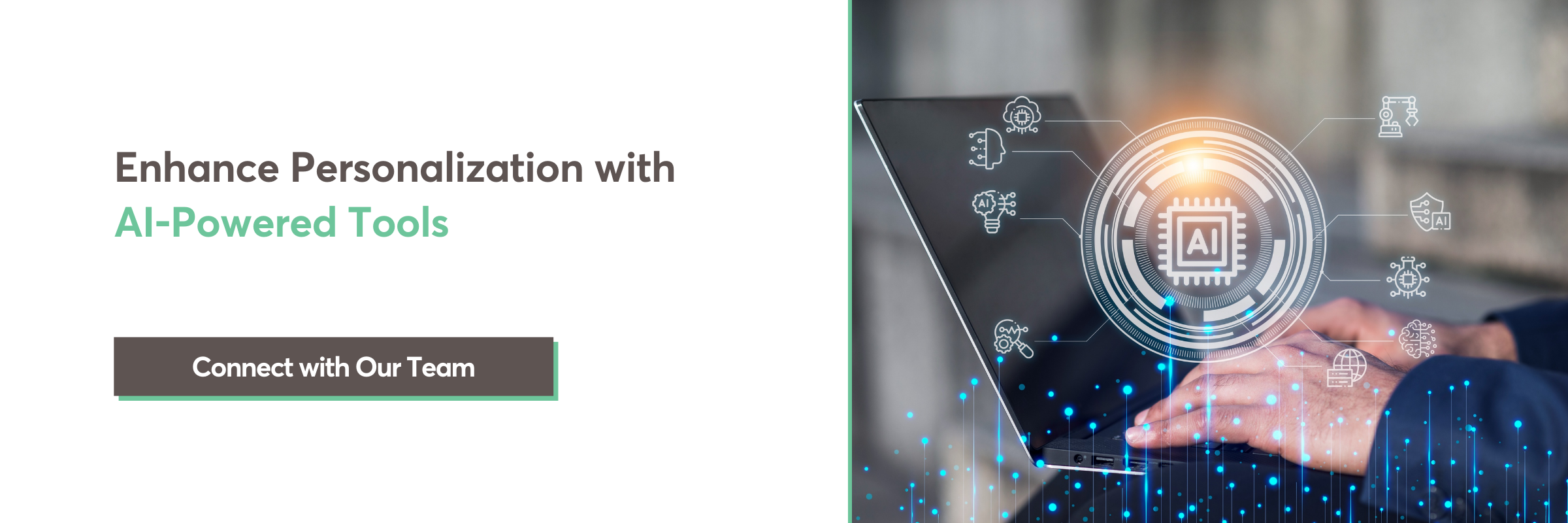
Imagine a customer browsing through an online store, unsure whether a particular piece of furniture will fit in their living room. With AI and AR, they can use their smartphone or tablet to virtually place the furniture in their space, giving them a realistic view of how it would look. This helps the customer make an informed decision and creates a memorable and interactive shopping experience. By incorporating AI and AR into their marketing strategies, businesses can provide a level of convenience and engagement that was previously unimaginable.
Role of AI in Voice Search Marketing
Voice search is rapidly gaining popularity, with more and more users relying on virtual assistants like Amazon’s Alexa or Apple’s Siri to search for information and make purchases. AI enables voice search capabilities by processing and understanding natural language. Marketers can leverage AI-powered voice search optimization strategies to ensure their content is voice search-friendly, increasing visibility and driving organic traffic. As voice search continues to evolve, businesses need to optimize their marketing strategies to cater to this growing segment.
The global voice recognition tech market reached close to 12 billion U.S. dollars in 2022 and is projected to amount to almost 50 billion U.S. dollars in 2029.
Picture a scenario where a user drives and wants to find a nearby coffee shop. Instead of typing their query into a search engine, they simply ask their virtual assistant for recommendations. Through AI-powered voice search, the virtual assistant understands the user’s intent, considers their location, and provides them with a list of nearby coffee shops. This seamless and hands-free experience saves time and enhances user satisfaction. By embracing AI in voice search marketing, businesses can tap into this expanding market and connect with customers more naturally and conveniently.
Final Thought
AI-powered digital marketing presents endless opportunities for businesses to stay ahead of the curve and achieve their marketing goals. Partnering with a digital marketing company that understands and leverages AI can enable businesses to deliver personalized experiences, optimize campaigns, and drive better outcomes. For professional guidance on streamlining your digital marketing strategies, connect with EvinceDev, a leader in delivering AI-driven solutions tailored to your needs. Get in touch with us here to elevate your business.
